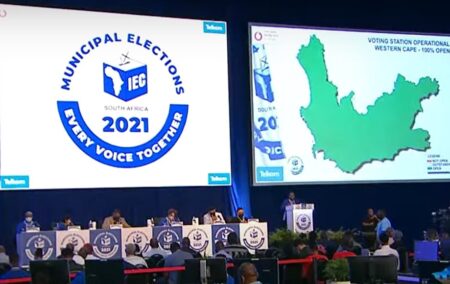The DA has won the election with just over two-thirds of the vote followed by the FF+ (18%) and then ActionSA (8.5%).
The ANC and EFF each won under one percent of the vote; the secessionists of the Cape Independence Party managed above one percent and the ACDP just shy of 2%.
Before you start celebrating (unless you a fan of the EFF or ANC) or start mourning (if you don’t like the DA), this was the result of a poll of Daily Friend readers in the run-up to yesterday’s election.
In the real-world local government ballot, votes are still being counted, and the Daily Friend will bring you updates as news emerges on the performance of the major parties.
What was clear by the time voting stations closed at 9pm was that the sixth post-apartheid local government election was marked by a possibly record low turn-out, which most analysts ascribe chiefly to apathy and political disaffection. The stay-away factor has been significant for some time; non-voters are the single biggest political bloc in South Africa.
By last evening, however, preliminary figures suggested the turn-out was well under 40%, compared to 58% in 2016.
An early indication of this phenomenon was the News24 report that preliminary voter turnout data as of 3pm ‘shows that suburban voter turnout in Johannesburg is surpassing voter turnout in Soweto by 14%’. News24 said its elections analyst Dawie Scholtz judged that this ‘will likely benefit parties who are more likely to receive suburban votes such as the DA, Freedom Front Plus, and ActionSA, while negatively affecting the ANC’.
Reuters reported that ‘based on the climate of discontent and the few surveys that have been conducted, some pundits predict the ANC’s vote share could fall below 50% for the first time since the end of apartheid’.
Reuters noted: ‘President Cyril Ramaphosa remains popular after mobilising government grants that prevented Covid-19 from becoming a hunger crisis. But lasting poverty, crumbling infrastructure and nearly a third of workers unemployed mean some voters have lost patience with the party that has ruled for 27 years.’
As for the Daily Friend’s own poll, it was not of course scientific and only tells us which party the 4 000 or so participating readers would have voted for.
The results are unsurprising given that most of our readers are likely to be broadly liberal-leaning (like the DA) and supportive of the free market (like the DA, FF+, and ActionSA).
Surprising were the 0.5% of respondents who said they would vote for the Organic Humanity Movement, which describes itself on Twitter as a ‘youth-led political movement on a mission to liberate SA through revolutionizing politics’.

